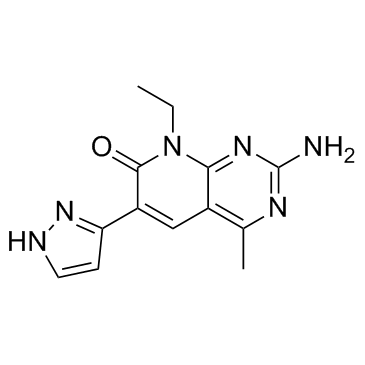934493-76-2
| Name | 2-amino-8-ethyl-4-methyl-6-(1H-pyrazol-5-yl)pyrido[2,3-d]pyrimidin-7-one |
|---|---|
| Synonyms |
unii-cvl1685gph
N-[4-({3-[(3,5-Dimethoxyphenyl)amino]-2-quinoxalinyl}sulfamoyl)phenyl]-3-methoxy-4-methylbenzamide Voxtalisib XL765 SAR245409 |
| Description | Voxtalisib (XL-765) is a potent PI3K inhibitor, which has a similar activity toward class I PI3K (IC50s=39, 113, 9 and 43 nM for p110α, p110β, p110γ and p110δ, respectively), also inhibits DNA-PK (IC50=150 nM) and mTOR (IC50=157 nM). Voxtalisib (XL-765) inhibits mTORC1 and mTORC2 with IC50s of 160 and 910 nM, respectively. |
|---|---|
| Related Catalog | |
| Target |
p110α:39 nM (IC50) p110β:113 nM (IC50) p110δ:43 nM (IC50) p110γ:9 nM (IC50) mTOR:157 nM (IC50) mTORC1:160 nM (IC50) mTORC2:910 nM (IC50) DNA-PK:150 nM (IC50) |
| In Vitro | Voxtalisib (XL-765) displays potent inhibitory activity against class I PI3K isoforms p110α, p110β, p110δ, and p120γ, with IC50s of 39, 110, 43, and 9 nM, respectively. The IC50 value for inhibition of PI3Kα by Voxtalisib (XL-765) is determined at various concentrations of ATP, revealing Voxtalisib (XL-765) be an ATP-competitive inhibitor with an equilibrium inhibition constant (Ki) value of 13 nM. Voxtalisib (XL-765) also inhibits mTOR (IC50s of 160 and 910 nM for mTORC1 and mTORC2, respectively) in an immune-complex kinase assay and the PI3K-related kinase DNA-PK (IC50 value of 150 nM). In contrast, Voxtalisib (XL-765) has relatively weak inhibitory activity toward the class III PI3K vacuolar sorting protein 34 (VPS34; IC50 value of ~9.1 μM). Consistent with its inhibitory activity against purified PI3K proteins, SAR245409 inhibits EGF-induced PIP3 production in PC-3 and MCF7 cells with IC50s of 290 and 170 nM, respectively. The ability of Voxtalisib (XL-765) to inhibit phosphorylation of key signaling proteins downstream of PI3K is examined by assessing its effects on EGF-stimulated phosphorylation of AKT and on nonstimulated phosphorylation of S6 in PC-3 cells by cell-based ELISA. Voxtalisib (XL-765) inhibits these activities with IC50s of 250 and 120 nM, respectively. In MCF7 and PC-3 cells, Voxtalisib (XL-765) inhibits proliferation (monitored by BrdUrd incorporation) with IC50s of 1,070 and 1,840 nM, respectively. To further characterize the effects of Voxtalisib (XL-765) on tumor cell growth, an assay monitoring the anchorage-independent growth of PC-3 and MCF7 cells in soft agar over a 14-day period is used. SAR245409 inhibits colony growth with an IC50 value of 270 nM in PC-3 cells and 230 nM in MCF7 cells[2]. |
| In Vivo | Oral administration of Voxtalisib (XL-765) causes a dose-dependent decrease of phosphorylation of AKT, p70S6K, and S6 in the tumors, reaching a maximum of 84% inhibition of S6 phosphorylation at 30 mg/kg at 4 hours. The dose-response relationships derive from the 4 hours time point predict 50% inhibition of AKT, p70S6K, and S6 phosphorylation to occur at doses of 19 mg/kg (pAKTT308 and pAKTS473), 51 mg/kg (p-p70S6K), and 18 mg/kg (pS6). Inhibition of AKT, p70S6K, and S6 phosphorylation in MCF7 tumors following a 30 mg/kg dose of Voxtalisib (XL-765) is maximal at 4 hours, reaching 61% to 84%; however, the level of inhibition decreases to 0% to 42% by 24 hours, and minimal or no inhibition is evident by 48 hours. Following a 100 mg/kg dose of Voxtalisib (XL-765), inhibition is also maximal at 4 hours (52%-75%)[2]. |
| Cell Assay | Cellular proliferation is assessed using the Cell Proliferation ELISA, Bromodeoxyuridine Chemiluminescence Kit. Cytotoxicity is assessed using the ATP Bioluminescence Assay as follows: PC-3, MCF7, A549, LS174T, MDA-MB-468, U87-MG, and OVCAR-3 cells are plated at densities of 7×103, 1.5×104, 6×103, 7×103, 7×103, 6×103, 1.5×104 cells per well, respectively, onto 96-well microtiter plates in culture medium, incubated at 37°C, 5% CO2 for 18 hours, and then treated with a serial dilution of compound in medium containing a final concentration of 0.3% DMSO. Triplicate wells are used for each compound concentration. Control wells receive 0.3% DMSO in media. Cultures are incubated at 37°C, 5% CO2 for an additional 24 hours and cells are then assayed for viability using the ViaLight HS Kit[2]. |
| Animal Admin | Mice[2] In vivo efficacy studies are performed in athymic nude mice. Tumor cells are cultured in DMEM supplemented with 10% FBS (20% for PC-3 and OVCAR-3 cells), Penicillin-Streptomycin, and nonessential amino acids at 37°C in a humidified 5% CO2 atmosphere. On day 0, cells are harvested by brief trypsinization, and 1 to 5×106 cells in 0.1 mL ice-cold Hanks Balanced Salt Solution are implanted subcutaneously (OVCAR-3) or intradermally (MCF7 and U-87 MG) into the hind flank of female athymic nude mice. In the case of the MCF7 model, an estrogen pellet (IRA) is implanted subcutaneously at the nape of neck at the time of tumor cell implantation. A total of 3×106 PC-3 cells are similarly harvested and implanted subcutaneously into the hind-flank of 5- to 8-week-old male nude mice. Tumor growth is monitored weekly with calipers until staging and dose initiation. During the dosing period, body and tumor weights are assessed. Voxtalisib (XL-765) is formulated in sterile water/10 mM HCl or water and administered at the indicated doses and regimens by oral gavage at a dose volume of 10 mL/kg. |
| References |
| Density | 1.4±0.1 g/cm3 |
|---|---|
| Molecular Formula | C13H14N6O |
| Molecular Weight | 270.29 |
| PSA | 103.21000 |
| LogP | 5.95 |
| Index of Refraction | 1.674 |
| Storage condition | -20℃ |
